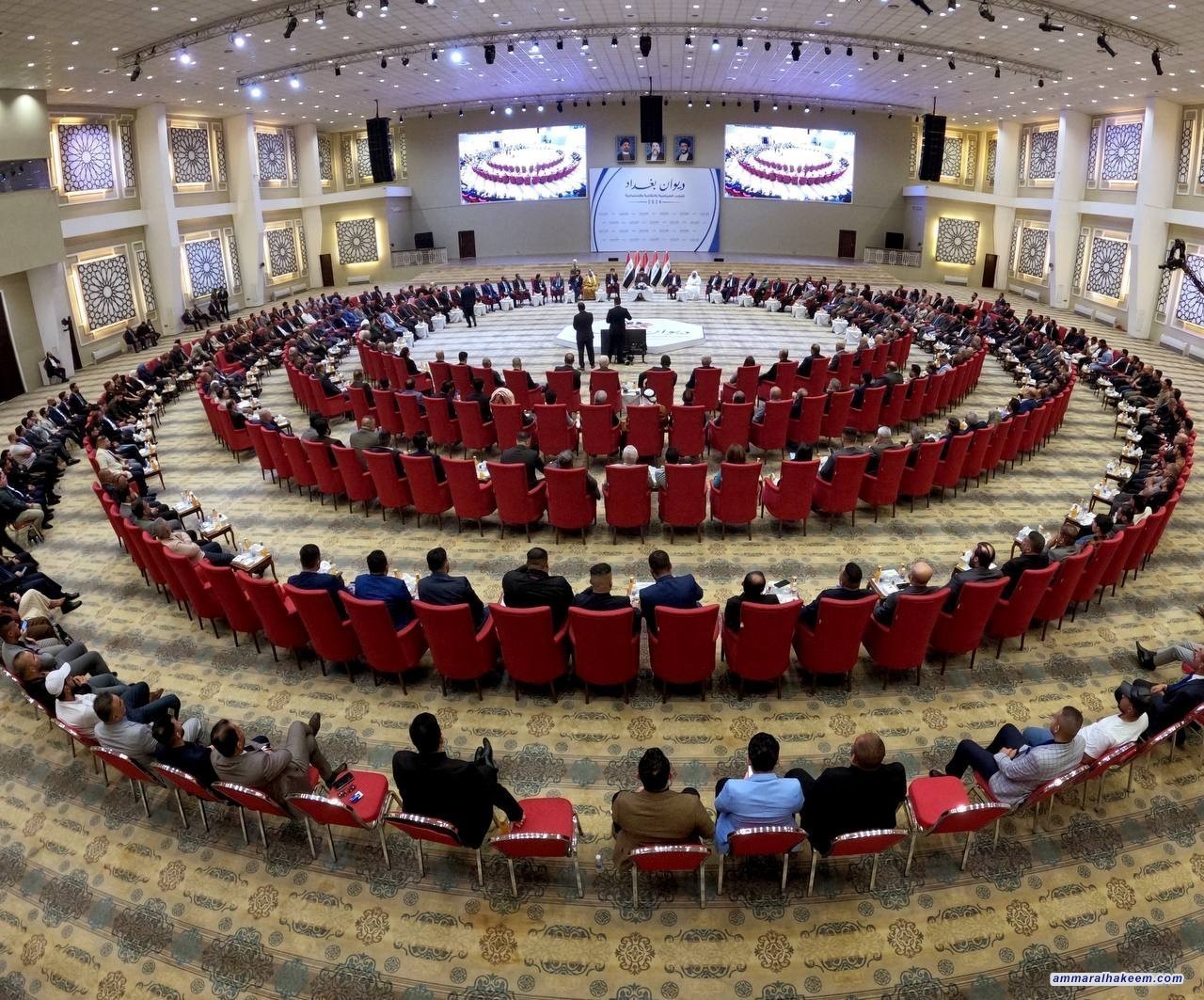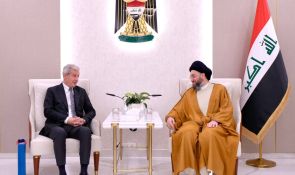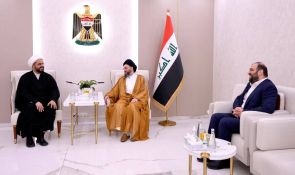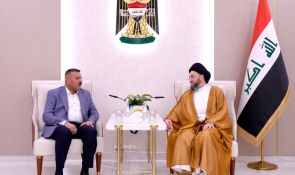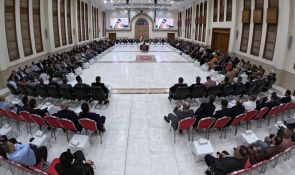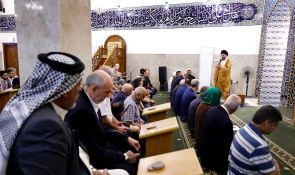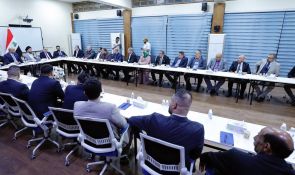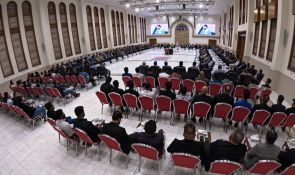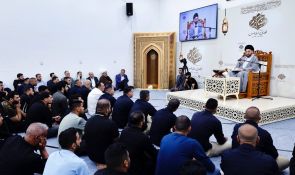Sayyid Al-Hakeem advocates ending international coalition through dialogue, common interest bilateral ties instead
Addressing the political, social, and union elites at Baghdad’s Diwan on March 9, 2024, Sayyid Ammar Al-Hakeem, Head of Al-Hikma National Movement, underscored the significance of dialogue and intellectual forums to discuss developments in the Iraqi landscape and the reconstruction agenda. H.E. extended congratulations to those present on the advent of the holy month of Ramadan and reiterated his best wishes to women on their International Day. Commencing his discourse with reflections on Gaza and its oppressed population, H.E. emphasized that the alarming number of casualties and injuries exposes a genocide witnessed globally, backed by international support and a continuous disregard for international resolutions aimed at halting the conflict. H.E. pointed out the jeopardy Western civilization values face in Palestine, coupled with extensive devastation in Gaza.
Moreover, H.E. pointed out that a different perspective on the crisis unveils the collapse of israel's victimhood narrative, cultivated over seventy years, along with political, economic, and social fractures within the israeli entity. H.E. expounded on Iraq's shift from conflict to social integration and stability, attributing it to effective diversity management and collective efforts. H.E. affirmed the commitment to transform Iraq's current stability into a lasting one, referencing the accomplishments of the state administration coalition and stressing that aligning people's interests with stability would make a return to chaos more challenging.
Concerning the security landscape, H.E. stated that the presence of vulnerabilities, including tribal conflicts, does not compromise the overall situation, underscoring the importance of addressing these issues to preempt concerns and problems. Stability, H.E. insisted, paves the way for development, evident in citizens' daily lives through ongoing projects and work. H.E. urged attention to the cumulative impact of previous governments' actions, emphasizing that development attracts public satisfaction and reinforces alignment with the political system.
H.E. reiterated the importance of preserving stability, supporting development, fostering optimism, and abandoning a pessimistic narrative. Sovereignty, H.E. asserted, is non-negotiable, and its achievement with minimal political and economic losses is imperative. Sovereignty, H.E. stressed, is a matter for the people, calling for a shared vision to attain and preserve it.
H.E. advocated for concluding the international coalition's mission, characterizing the presence of 86 countries as akin to international guardianship. H.E. urged friendly dialogues for resolution and, secondly, establishing bilateral relations with coalition countries in alignment with Iraqi interests. H.E. underscored the necessity of building mutual trust among the components of Iraqi society, stating that initiating bilateral relations with coalition countries would expedite the international coalition's conclusion.
H.E. indicated the provincial councils' role in restoring decentralization to the country and stressed the importance of aligning the election law with the political system's philosophy rather than temporary factional interests. H.E. called for the enactment of a clear and consistent electoral law after two decades, expressing reservations about hastily enacted amendments aimed at favoring one faction over another. H.E. noted that recent elections reinstated balance, confirming political understanding in over 80% of mutual commitments regarding elections.
H.E. warned against continued dependence on a single-source rentier economy and stated that linking the economy to oil has both immediate and long-term detriments. H.E. called for the quintessence of productive sectors: industry, agriculture, tourism, investment, and technology. Affirming that the political process hinges on commitment to the constitution and political agreements, H.E. emphasized the government's adherence to the program and political agreements, and reiterated His call for the election of a new Speaker of the Parliament to reassure the honorable Sunni component, cautioning against stirring issues with the concerned related to the delayed election of a new Speaker. H.E. stated that postponement once happened due to a request from the same component due to fears of it affecting the elections of the provincial councils. H.E. called for Sunni intracomponent agreement or agree upon a method for a preliminary election system among the MPs of the component to elect a candidate agreed upon by all parties, affirming that the matter is political and the avoidance of engaging the federal court in it is imperative.
H.E. highlighted the multifaceted challenges posed by drug addiction, emphasizing the need for infrastructure and noting its close connection to unusual crimes in the country. H.E. called for the acceptance of the entire constitution to resolve disputes between the federal and regional governments and advocated for mutual concessions. Commending Mr. Al-Sudani's efforts in resolving disputes and advancing agreements, highlighting the shift from decentralization to centralization due to the prolonged absence of provincial councils. H.E. urged these councils to reclaim their rights, affirming that Iraq's strength is sufficient to address sovereignty issues and interventions from neighboring countries.
H.E. called for activating the private sector and socially integrating people with disabilities. H.E. stressed the importance of involving relevant parties in legislation directly affecting them. Additionally, H.E. highlighted the need for political consensus on the oil and gas law. H.E. also emphasized the importance of gradual progress toward goals and aligning university outputs with labor market needs.
H.E. stressed the need for a separate voter registry based on components to ensure quotas and fair representation, which aligns with the philosophy of component representation. H.E. called for observing the political system's ability to address problems and praised the formation of the Council of Governors for its support of governorates. H.E. also advocated for the establishment of a "Fund of Generations."
Regarding Sinjar, His Eminence stated its transformation into a regional and international conflict, urging the implementation of the law for survivors of ISIS.

